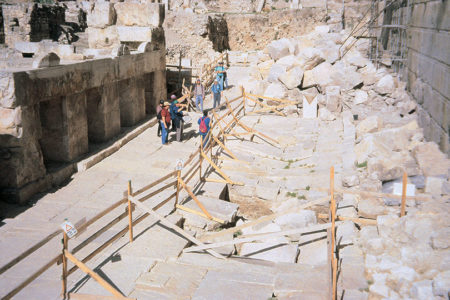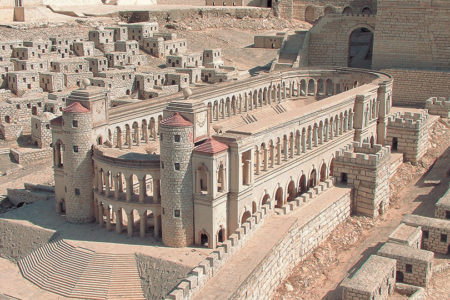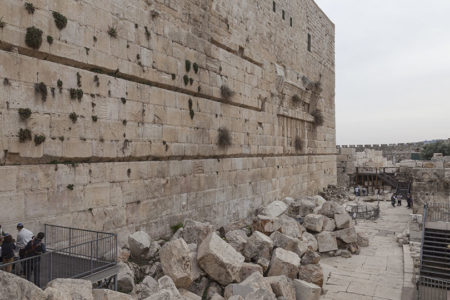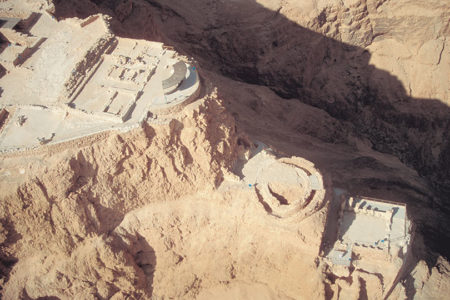Declaring Nineveh’s Destruction
Nahum 1:1-15
In the days of the prophet Nahum, Nineveh was at the height of its glory. Its influence through trade, culture, and political conquest extended from Egypt to the Persian Gulf. The city was built by Nimrod (Gen. 10:8–11) on the east bank of the Tigris River, where the Tigris meets the Khoser River, opposite present-day Mosul, Iraq. As the capital of Assyria, Nineveh was a large city, stretching 2.5 miles along the Tigris River. It was eight miles in circumference and had a population of nearly 600,000.
The city had fifteen gates and 50-foot-high walls thick enough for three chariots to ride on side by side. And it was notorious for idolatry and immorality (Nah. 3:1, 19).
The Assyrians were a cruel people. King Ashurbanipal boasted of his violence and atrocities. These included tearing off people’s limbs, putting out their eyes, impaling them on poles, boiling them in tar, ripping out their tongues, and skinning them alive. Assyrians decapitated their enemies and piled the heads in pyramids as monuments to their victories. A conquered city was sacked and its survivors deported to Assyria as slaves.
Although the nation possessed a sense of invulnerability for almost three hundred years, by the sixth century B.C. Assyria’s prominence and power were waning.
God commissioned Nahum to proclaim Nineveh’s coming destruction. Nothing is known about the prophet. His background, family, and occupation are shrouded in silence. The text states only that Nahum was an Elkoshite (1:1), possibly a reference to Elkosh where he lived. Scholars have identified Elkosh as one of three cities: Al Qosh in northern Iraq near Mosul, Capernaum (literally, “village of Nahum”) in northern Galilee, or a city in southern Judah. Nahum’s hometown cannot be indisputably identified. Nahum means “comfort,” an apt expression of the comfort his message brought to Judah.
The date of Nahum’s prophecy also is uncertain. It had to be written after Ashurbanipal destroyed No-amon (Thebes) in 663 B.C. (3:8) but before Nineveh’s destruction in 612 B.C. Thus scholars date the prophecy between 650–620 B.C.
The prophet’s style was pictorial and poetic. He used many metaphors, similes, rhetorical questions, and figures of speech to describe God’s judicial indignation toward Nineveh’s brutality and to proclaim its impending destruction. The book of Nahum is a sequel to the prophecy of Jonah.
Chapter 1 reveals Nahum’s commission, the character and power of Almighty God, and the collapse of the godless Assyrians.
Commissioned by God
The prophet began by saying, “The burden of Nineveh. The book of the vision of Nahum, the Elkoshite” (v. 1). Nahum spoke of God’s revelation to him as a “burden” and “vision.” The word burden means to “lift up” and was used to describe an object that was heavy to lift. When used by the prophets, the word referred to lifting one’s voice to proclaim a heavy prophecy from God, such as the announcement of judgment.
Nahum’s message was heavy indeed because it described the destruction of Nineveh—the most prominent, powerful nation in the Middle East at the time and a definite threat to Judah. The prophet’s message came from Jehovah in the form of a vision, that is, a mental revelation that Nahum immediately wrote down.
Character of God
Nahum began by describing God’s attributes, character, and inflexible justice. The prophet revealed that the Lord is an omniscient, omnipotent, sovereign God who is in total control of His creation. Nahum revealed that “God is jealous” (v. 2). He is zealous to defend His honor against all who try to rob Him of His righteousness and covenant relationship with Judah (cf. Ex. 20:5).
God also will punish wrongdoers: “The LORD avengeth, and is furious [master of wrath]; the LORD will take vengeance on his adversaries, and he reserveth wrath for his enemies” (v. 2). The words LORD and avengethare used three times in this verse and reveal God’s vengeance toward His adversaries. Vengeance belongs to God alone. He does not vent vengeance and wrath to get even, but to vindicate His holiness in righteous justice against the offender. He never forgets the injustices of His adversaries and reserves His wrath for the proper time of punishment (Dt. 32:35, 41).
God patiently withholds judgment: “The LORD is slow to anger, and great in power, and will not at all acquit the wicked” (v. 3). His slowness to implement judgment does not mean He is weak, indecisive, or capricious, but that He is patient and long suffering toward the wicked, hoping they will repent. This attribute was illustrated when Jonah preached to Nineveh a century earlier. Revival broke out there. The nation repented, resulting in God sparing the city. God will never excuse or acquit the wicked who do not repent and will punish when He so chooses, with just indignation.
Verses 3–8 picture the Lord as a powerful, divine warrior who destroys His enemies but protects His people: “The LORD hath his way [path or road] in the whirlwind and in the storm, and the clouds are the dust of his feet” (v. 3). When God marches out to do battle with Nineveh, He will be as destructive as a whirlwind and storm. He will move swiftly, covering vast areas; and clouds will seem like particles of dust under His feet. In His “rebuke” He simply speaks and the sea and rivers dry up (v. 4), as did the Red Sea before He brought it down on the Egyptian army (Ex. 14:20–31).
If God is powerful enough to dry up the pastures of Bashan, the fertile fields of Carmel, and the forest of Lebanon (v. 4) with only the word of His mouth, surely He can do the same to Nineveh.
When God vents His wrath, nothing on Earth is able to stand. Mountains shake apart, “hills melt [dissolve], and the earth is burned [heaved up] at his presence” (v. 5). That is, the earth trembles at God’s terrifying power. Nahum asked, “Who can stand before his indignation [rage]? And who can abide [endure] in the fierceness of his anger [wrath]?” (v. 6). The obvious answer is no one! When God displays His wrath, it “is poured out like fire” (v. 6) or like molten lava from an erupting volcano.
While one aspect of the Lord’s character involves anger, revenge, wrath, and punishment, another side is protective: “The LORD is good [innately and inherently good in His being], a stronghold [refuge] in the day of trouble, and he knoweth those who trust in him” (v. 7). Jehovah’s power is as awesome to protect His people as it is to destroy His enemies. To His enemies, such as Nineveh, God will be “an over-running flood” and “will make an utter end of the place, and darkness shall pursue his enemies” (v. 8).
The word flood could refer to a literal flood or a massive army invasion. Both destroyed Nineveh. The destruction of the Assyrians was total. Without God, they will live eternally in the lake of fire.
Collapse of the Godless
Addressing the Assyrians through Nahum, God asked, “What do ye imagine against the LORD? He will make an utter end; affliction shall not rise up the second time” (v. 9). How ludicrous it was for them to think they could fight the God of Israel. The one who plotted evil “against the LORD” and Judah was “a wicked [worthless] counselor” (v. 11), a reference to Sennacherib, who failed to destroy Judah because the angel of the Lord destroyed his army. Sennacherib returned to Nineveh only to be assassinated by his sons. Assyria never had another chance to come against Judah (2 Ki. 9:13—19:37).
God assured Judah that He would keep His promise to deliver her from the Assyrians:
Thus saith the LORD: Though they be quiet [safe and in full strength], and likewise many, yet thus shall they be cut down [shaved off], when he [Sennacherib] shall pass through [pass away from Jerusalem]. Though I [God] have afflicted thee [Judah, by means of Assyria], I will afflict thee no more (v. 12).
Thus the Lord will “break his [Assyria’s] yoke from off thee [Judah], and will burst thy bonds [shackles] in sunder” (v. 13).
Assyria believed it was impregnable and fortified from invasion as a thick thorn hedge. But it reveled in a false security. While the Assyrians were in a drunken stupor, the Babylonians and Medes invaded Nineveh and destroyed it like stubble burned in the fire, as prophesied in verse 10.
The prophet further revealed, “And the LORD hath given a commandment concerning thee [Nineveh], that no more of thy name be sown” (v. 14). This direct edict from the Lord revealed that Nineveh and Sennacherib’s dynasty would become extinct and Assyria would cease to exist.
As the Assyrians destroyed the gods of those they conquered, so their gods would be destroyed. The Lord said, “Out of the house of thy gods [temple of Ishtar or Nabu] will I cut off the carved image and the melted [molded] image” (v. 14). Assyria and her capital, Nineveh, along with her gods and house of worship, would be annihilated and pass into oblivion.
Nahum prophesied that Jehovah Himself would prepare Nineveh’s grave: “I will make thy grave; for thou art vile” (v. 14). Nineveh had been weighed on God’s scales of justice and was found wanting. God so loathed Nineveh’s vile heathen practices that He buried them out of His sight and that of the world.
The Hebrew Bible places verse 15 at the beginning of chapter 2 because it addresses Judah, not Nineveh. Judah was still under Assyrian oppression at the time of Nahum’s prophecy, but such oppression would soon be removed. Assyria, although powerful, will come to an end. The good news of Assyria’s coming judgment is pictured as being brought by the feet of a swift runner: “Behold upon the mountains the feet of him that bringeth good tidings, that publisheth peace!” (v. 15).
News of liberation and peace should cause Judah to rejoice and keep her religious feasts and sacred vows to the Lord (v. 15). Isaiah used the same words (Isa. 52:7) to speak of Judah’s deliverance from Babylon. Paul quoted this verse in Romans 10:15 and applied the words good news to the preaching of salvation through faith in Jesus the Messiah.
Nahum said Judah should also rejoice because “the wicked [wicked one] shall no more pass through thee [Judah]; he is utterly cut off” (v. 15). Assyria would be destroyed, never to march through Israel again. The prophecy has an even greater application for modern Israel. It foreshadows the day when the Messiah will annihilate all Israel’s enemies. This event will occur at the end of the Great Tribulation, when Messiah returns to Earth to set up His Millennial reign. In that day Israel will be forever liberated to live in peace and worship the Lord in holiness.







